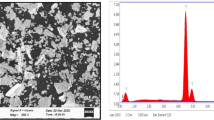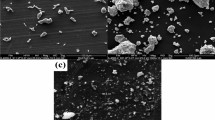Abstract
In this research, the effect of residual stress on the fatigue crack growth behavior in an aluminum alloy-hybrid metal matrix composite (Al alloy-Hybrid MMC) bi- material system has been investigated and the fatigue life of the bi-material has been predicted based on the crack closure technique. Conventional three-point bending fatigue test was carried out in a rectangular notched specimen and the plastic replica technique was used to observe the fatigue crack growth (FCG). The residual stress was measured by the strain relieving method. The fatigue life was predicted by classifying the expression of FCG rate and the effective stress intensity factor, ΔKeff. The results show that the crack propagates slowly in the MMC layer side and maximum crack retardation occurs in the boundary region of the bi-material system due to the change of the state of residual stresses around the boundary. A curved crack front is observed in the aluminum alloy side near the boundary of the bi-material which forms a corner crack that decelerates the crack growth in the vicinity of the boundary of the bi-material even at higher ΔK.












Similar content being viewed by others
References
A. Mkaddem, M. El Mansori, On fatigue crack growth mechanisms of MMC: reflection on analysis of ‘multi surface initiations.’ Mater. Des. 30, 3518–3524 (2009)
Z.Z. Chen, K. Tokaji, Effects of particle size on fatigue crack initiation and small crack growth in SiC particulate-reinforced aluminium alloy composites. Mater. Lett. 58(17–18), 2314–2321 (2004)
X. Yang, C.R. Liu, Investigating machining impact on fatigue variance: a machining quality perspective. J. Manuf. Sci. Eng. 127(3), 492–502 (2005)
X. Yang, C.R. Liu, A.F. Grandt, An experimental study on fatigue life variance, residual stress variance and their correlation of face-turned and ground Ti6Al-4V samples. J Manuf. Sci. Eng. 124(4), 809–819 (2002)
A.A. Iqbal, Y. Arai, Study on low cycle fatigue behaviour of cast hybrid metal matrix composites. Int. J. Auto Mech. Eng. 11, 2504 (2015)
W. Paepegem, J. Degrieck, A new approach of residual stiffness and strength for fatigue of fibre-reinforced composites. Int. J. Fatigue. 24(7), 747–762 (2002)
J.J. Bonnen, J.E. Allison, J.W. Jones, Fatigue behavior of a 2xxx series aluminum alloy reinforced with 15 Vol Pct SiCp. Metall. Trans. A. 22A, 1007–1019 (1991)
M. Sasaki, L. Lawson, M. Meshii, Low-cycle fatigue properties of a SiC whisker reinforced 2124 aluminum alloy. Metall. Trans. 25A, 2265–2274 (1994)
N. Chawla, C. Andres, J.W. Jones, J.E. Allison, Effect of SiC volume fraction and particle size on the fatigue resistance of a 2080 Al/SiCp composite. Metall. Mater. Trans. A. 29A, 2843–2854 (1998)
Y. Sugimura, S. Suresh, Effects of SiC content of fatigue crack growth in aluminum alloys reinforced with SiC particles. Metal. Trans. A. 23, 2231–2242 (1992)
O. Botstein, R. Arone, B. Shpigler, Fatigue crack growth mechanisms in Al−SiC particulate metal matrix composites. Mater. Sci. Eng. A. 128, 15–22 (1990)
A.A. Iqbal, Y. Arai, W. Araki, Effect of hybrid reinforcement on crack initiation and early propagation mechanisms in cast metal matrix composites during low cycle fatigue. Mater. Des. 45, 241–252 (2013)
J.J. Mason, R.O. Ritchie, Fatigue crack growth resistance in SiC particulate and whisker reinforced P/M 2124 aluminum matrix composites. Mater. Sci. Eng. A. 231, 170–182 (1997)
A.A. Iqbal, Y. Arai, W. Araki, Fatigue crack growth mechanism in cast hybrid metal matrix composite reinforced with SiC particles and Al2O3 whiskers. Trans. Nonferrous Met. Soc. China. 24, s1–s13 (2014)
T. Tanaka, M. Hori, The propagation of the fatigue crack crossing the interface of metal composites under the effect of residual thermal stress. Bull. JSME. 22(172), 1359–1367 (1979)
A.A. Iqbal, S. Chen, Y. Arai, W. Araki, Study on stress evaluation in SiC particles during crack propagation in cast hybrid metal matrix composites using Raman Spectroscopy. Eng. Failure Anal. 52, 109–115 (2015)
K. Ohji, M. Kubo, H. Tsuji, H. Ogawa, K. Sakurada, Methods of predicting fatigue crack growth lives in residual stress fields. Trans. JSME. 53, 1516–1524 (1987)
K.J. Kang, J.H. Song, Y.Y. Earmme, Fatigue crack growth and closure through a tensile residual stress field under compressive loading. Fatigue Fract. Eng. Mater. Struct. 12(5), 363–376 (1989)
K.J. Kang, J.H. Song, Y.Y. Earmme, Fatigue crack growth and closure behaviour through a compressive residual stress field. Fatigue Fract. Eng. Mater. Struct. 13(1), 1–13 (1990)
D.R. Ni, D.L. Chen, B.L. Xiao, D. Wang, Z.Y. Ma, Residual stresses and high cycle fatigue properties of friction stir welded SiCp/AA2009 composites. Int. J. Fatigue. 55, 64–73 (2013)
F. Fiori, E. Girardin, A. Giuliani, T. Lorentzen, A. Pyzalla, F. Rustichelli, V. Stanic, Neutron diffraction measurements for the determination of residual stresses in MMC tensile and fatigue specimens. Phys. B. 276, 923–924 (2000)
H.C. Choi, J.H. Song, Finite element analysis of closure behaviour of fatigue cracks in residual stress fields. Fatigue Fract. Eng. Mater. Struct. 18(1), 105–117 (1995)
T. Fett, E. Diegele, D. Munz, G. Rizzi, Weight functions for edge cracks in thin surface layers. Int. J. Fract. 81, 205–215 (1996)
S. Suresh, Y. Sugimura, T. Ogawa, Fatigue cracking in materials with brittle surface coatings. Scripta Metall. 29, 237–242 (1993)
T.L. Anderson, Fracture Mechanics: Fundamentals and applications, 4th edition, (2017).
M.T. Milan, P. Bowen, Experimental and predicted fatigue crack growth resistance in Al2124/Al2124+35%SiC bi-material. Int. J. Fatigue. 25, 649–659 (2003)
A.A. Iqbal and Y. Arai, Investigation of the fatigue crack propagation behaviour in the Al alloy/Hybrid MMC Bi-layer material. IOP conference series, Materials Science and Engineering, (2017).
Acknowledgment
The authors express gratitude to the Strength of materials lab, Saitama University, Japan for the technical and financial support of this research work.
Author information
Authors and Affiliations
Corresponding author
Additional information
Publisher's Note
Springer Nature remains neutral with regard to jurisdictional claims in published maps and institutional affiliations.
Rights and permissions
About this article
Cite this article
Iqbal, A.A., Arai, Y. & Araki, W. Influence of Residual Stress on the Fatigue Crack Growth Mechanism in the Al-Alloy/Hybrid MMC Bi-Material. J Fail. Anal. and Preven. 22, 1468–1477 (2022). https://doi.org/10.1007/s11668-022-01432-7
Received:
Revised:
Accepted:
Published:
Issue Date:
DOI: https://doi.org/10.1007/s11668-022-01432-7




